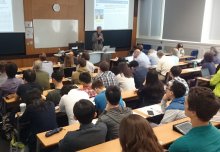

Packed lecture theatre
CPE Annual Symposium 2017
The CPE Annual Symposium and Researchers' Symposium was held on Monday 26 and Tuesday 27 June and featured 10 invited talks from external speakers.



CPE Annual Symposium 2017
The CPE Annual Symposium and Researchers' Symposium was held on Monday 26 and Tuesday 27 June and featured 10 invited talks from external speakers.


Shell-Imperial AIMS Centre: A Multidisciplinary Approach To Tackle Corrosion
The Shell-Imperial Advanced Interfacial Materials Science (AIMS) Centre was launched in March 2016.


Researchers uncover secret of nanomaterial that makes harvesting sunlight easier
Using sunlight to drive chemical reactions, such as artificial photosynthesis, could soon become much more efficient thanks to nanomaterials.
 2
2


Single-molecule graphene switches bring minute electronic devices a step closer
Researchers have discovered how to control molecules attached to graphene, paving the way for tiny biological sensors and devices to hold information.


Silicon device solves overheating problem in lab analysis technique
A silicon nano-device that funnels laser light to a tightly focused spot can probe biological molecules to explore their potential use as new drugs.


New professorship for nanotechnology research into how materials behave
Women in Engineering Day off to a good start with the announcement of the Shell/Royal Academy of Engineering Research Chair for Professor Mary Ryan.


Self-assembling nanoparticle could improve MRI scanning for cancer diagnosis
Scientists have designed a new self-assembling nanoparticle that targets tumours, to help doctors diagnose cancer earlier.


Imperial physicist shares $1M Kavli Prize for perfect lens
Professor Sir John Pendry, known for his work on the 'invisibility cloak' and the perfect lens, has been awarded the 2014 Kavli Prize in Nanoscience.


"Nanobiopsy" allows scientists to operate on living cells
Scientists have developed a device that can take a "biopsy" of a living cell, sampling minute volumes of its contents without killing it.
 2
2


Video
Scientists untangle nanotubes to release their potential in electronics industry
Researchers have demonstrated how to produce electronic inks for the development of new applications using the 'wonder material', carbon nanotubes.